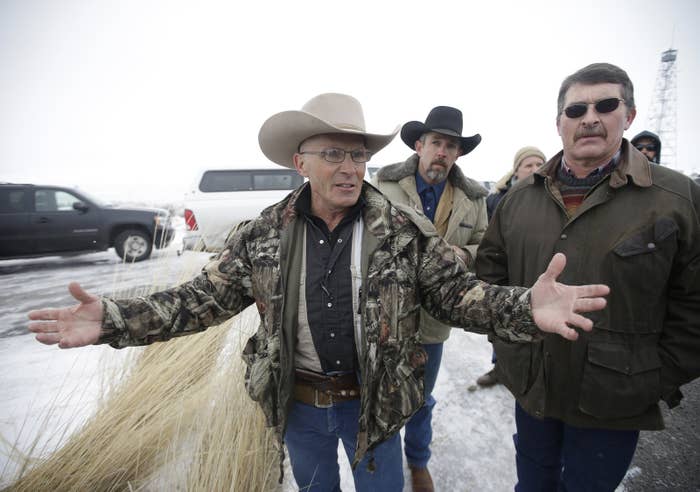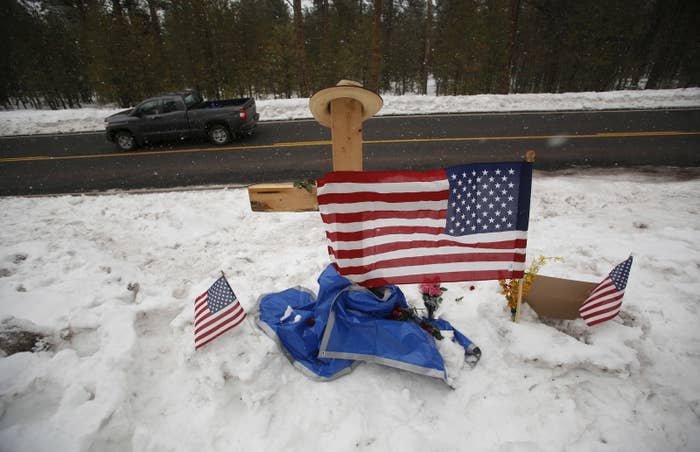
The family of Arizona rancher Robert "LaVoy" Finicum, who was killed by police during the armed occupation of a wildlife refuge in Oregon, has filed a federal lawsuit alleging the man was "deliberately executed by a preplanned government ambush."
Attorneys for the family filed the wrongful-death suit Thursday, just one day before the two-year anniversary of Finicum's death. Since then, Finicum's name has become a rallying cry for those who oppose the federal government's control of public lands, as well as militia groups and others who supported the armed 2016 standoff.

In their complaint, attorneys for Finicum's family allege that the rancher was killed at the end of a tense standoff with federal agents "assassination style, by one or more militarized officers of the Oregon State Police." The family is seeking $70 million in damages — $5 million each for his widow and their 12 children, plus his estate.
An FBI spokesperson told BuzzFeed News the agency does not comment on ongoing litigation.
Finicum was shot by an Oregon State Police officer on Jan. 26, 2016, after fleeing authorities in a truck on a narrow, isolated road. Following a brief chase with law enforcement, Finicum exited his vehicle, put his hands in the air and then reached toward a jacket pocket that contained a handgun, authorities said. He was shot three times in the back and died at the scene.
Attorneys for the family compared the shooting to that of a North Korean defector trying to desperately flee to safety in South Korea in November 2017. Like the defector, attorneys argue Finicum was attempting to cross county lines toward a local sheriff who had been sympathetic and supportive of the refuge occupiers.
"Unlike the North Korean who fled for the border to safety in 2017, after LaVoy Finicum was shot in the back — he died," the complaint reads.
The suit names several people and entities as defendants, including the FBI, the Bureau of Land Management, Oregon State Police, Oregon Gov. Kate Brown, and Harney County Sheriff David Ward, among others.
Finicum had been an outspoken critic of the Bureau of Land Management on social media and in 2014 he traveled to Bunkerville, Nevada, in support of Cliven Bundy, a rancher engaged in an armed standoff with federal agents over unpaid grazing fees.
Two years later, when Bundy's sons Ammon and Ryan descended on Oregon's Malheur National Wildlife Refuge to protest the government's management of public lands and imprisonment of two local ranchers, Finicum joined and became a de facto spokesperson for the group.

When leaders of the occupation were traveling to a neighboring county to speak to ranchers, Oregon State Police and FBI agents pulled over the two-car caravan, taking most of them into custody.
Finicum, who was driving the leading truck, sped off in a short pursuit with law enforcement that ended when he swerved off the road to avoid a police barricade and was shot by troopers.
Key figures involved in the Nevada and Oregon standoffs were charged by federal officials, but leaders of the group — including Cliven, Ammon, and Ryan Bundy — escaped conviction.
In Oregon, the Bundys were acquitted by a jury of charges related to the standoff. In Nevada, charges against the family were dismissed when a federal judge found that prosecutors and investigators had withheld crucial evidence that defense attorneys could have used in their arguments against the government.
The trials dealt a significant blow to federal prosecutors in what has been perceived as bungled cases against leaders of the armed occupations.
The two attorneys representing the Finicum family, Lisa Ludwig and J. Morgan Philpot, also represented Ryan and Ammon Bundy, respectively, in the criminal cases.
In the complaint, attorneys representing Finicum's family echoed the allegations made by the Bundys in their trials, including that the rancher was targeted by law enforcement officials as a result of an "internal conspiracy within the Department of the Interior."
Finicum, the suit alleges, was killed because of his associations to the Bundy clan, his membership of the Church of Jesus of Latter-day Saints, and his political views on public lands.
